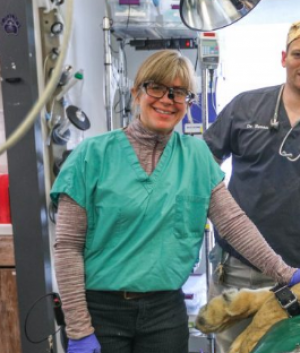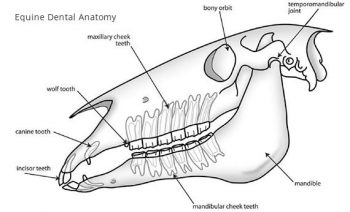Dr. Colleen Turner (DVM ’01) took a creative path to veterinary medicine—literally. She earned a Bachelor of Fine Arts in studio art before spending time working with Morgan horses and deciding that she wanted to pursue veterinary school. After practicing for a while, Turner found herself particularly enjoying veterinary dentistry and the way it reminded her of sculpture and visual art. Now, she practices equine dentistry in Michigan, Ohio, and Indianna, and she is finishing up her third summer as a member of the dedicated team of veterinarians who care for the horses on Mackinac Island. This summer is especially meaningful for Turner, as she is celebrating a major milestone: officially achieving diplomate status with the American Veterinary Dental College (AVDC).

Can you describe your career path after graduating from MSU?
I initially had two jobs, one in a mixed animal practice, and one in an equine dental practice. I quickly realized that I loved dentistry and began to work more in that practice and less in the mixed animal practice until I was working full time doing equine dentistry. I am also an adjunct professor with MSU Large Animal Clinical Sciences.
What does your work as an adjunct professor entail?
I see referral cases in the large animal hospital on a weekly or bi-weekly basis. Many of the cases are referred by area veterinarians who find dental issues that are beyond the scope of their practice. Some of the cases are in-house, referred by the MSU care teams as they find dental problems in their medicine or surgery cases. Some I find in my routine work and refer to myself! The cases are surgical extractions, dental sinusitis, periodontal disease, jaw fracture repairs, root canal therapy, and the like. I also teach equine dentistry to veterinary students, although that is an area that is sorely in need of expansion!
What drove you to focus on dental care within the veterinary field?

I learned nearly everything that I know about dentistry following graduation. As the years piled up, I came to the conclusion that teeth are at the root (pun intended!) of many, many maladies that affect all species. In people, the mouth is known to be the gateway to health, and the same can be said for animals. Additionally, horses wear tack on their faces, and often bits in their mouths, and these things can produce problematic behavior when the horse's dental needs have not been addressed.
What is the process like to become a diplomate of the American Veterinary Dental College?
As in other specialties, there is a residency requirement. I began my journey to taking the board exam when there was a window for people who had been exclusively practicing equine dentistry for ten years or more to obtain “advanced standing.” This allowed me to stay in my practice and amass the case log and many other requirements without having to change location for a traditional residency. Besides logging hundreds of cases, submissions such as a complete (and flawless) radiograph set and two original publications (one peer-reviewed) were some of the steps required by the AVDC in order to credential and be allowed to sit the two-day written exam. Upon passing the written portion, the candidate is then eligible to sit the two-day practical exam. The pass rate on the first attempt of the practical is not high, and the practical exam is offered only once a year, so the process can be long and expensive. Once all requirements have been met and all portions of the exam have been passed, one may now call themselves a specialist in equine dentistry.
What does it mean to you to have achieved diplomate status?
I have been working at this goal for many years and have sacrificed aspects of my personal and professional life in pursuit of it. One of the reasons that I am uniquely qualified for this specialty of veterinary medicine is that I am stubborn and tenacious. Dentistry in general and equine dentistry specifically require the practitioner to have a deep streak of “never die” within them. It was a huge win for me to have achieved diplomate status with the AVDC.
Is there anything you learned at MSU that helped you achieve this accomplishment?
I learned that no matter what you think your career will look like, don’t be surprised if you are pulled into an aspect of vet med that may have never crossed your radar!
What is your favorite way to celebrate being a Spartan?
Two of my kids are now Spartans, and they are doing the entire undergrad experience, which I did not do at MSU. It has been exciting and fun to support them as they make their way into neuroscience and classical trumpet, respectively. I love to watch the MSU Marching Band. But probably my favorite activity on campus is hiking about and marveling at the many trees and plants. MSU has an amazing campus!
Keep an eye out for the story of Turner’s work on Mackinac Island in the upcoming issue of INSIGHTS!
